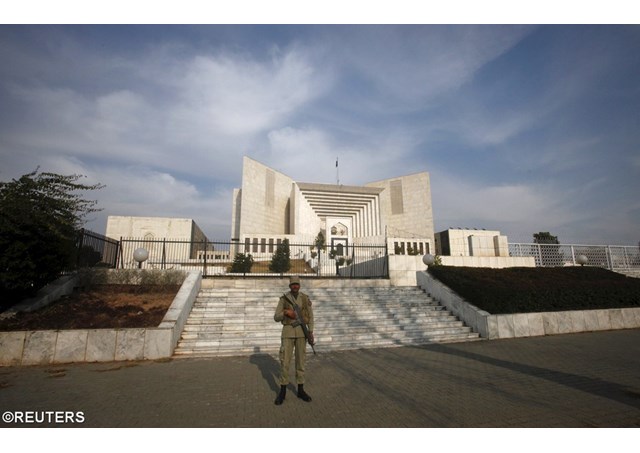
Pakistan: Church, rights groups decry continuation of military courts

(Vatican Radio) Pakistan's Supreme Court has upheld the establishment of controversial new military courts set up to hear "terrorism" cases, rejecting an attempt to have them ruled illegal.
Politcians approved on Wednesday a change to the constitution in January to establish the courts, created as part of a crackdown on anti-government fighters following a Taliban massacre at a school which left more than 150 people, mostly children, dead.
The move prompted concern from human rights activists and in April a group of lawyers challenged the constitutional amendment that created them. Civil rights activists have viewed the ruling as a major setback, "but the Pakistani government sees it as a necessity in order to crush this rising wave of terrorism".
In an interview following the decision, Bishop Samson Shukardin of Hyderabad expressed concern that the use of military courts will lead to rapid death penalty verdicts.
“I believe a fair judgment cannot be made in haste. Everybody deserves a chance to present their case without pressure in government courts,” said the former director of the diocesan office of the bishops’ conference’s National Commission for Justice and Peace.
“Speedy trials and executions cannot guarantee justice. Such systems have no space in true democracy.” Pope Francis has spoken out against the death penalty, calling it “an affront to the sanctity of life and the dignity of the human person” in a March letter.
A 17-member bench of the Supreme Court dismissed the petition by 11 votes to six, Chief Justice Justice Nasir-ul-Mulk said in a brief ruling, before a detailed judgement expected later.
Former Supreme Court Bar Association President Kamran Murtaza said "It's a very disappointing verdict by the apex court. The court just upheld the doctrine of necessity. We are going to file a review petition against this judgement."
Kamran Murtaza and Asma Jehangir had earlier this year petitioned against the establishment of military courts on behalf of the SCBA.
"We stated in our petitions that the matter of military courts is not in accordance with the constitution and it is against human rights," Murtaza said. Pakistan execution raises concerns over death penalty
"It affects the basic structure and independence of judiciary itself." Parliament has approved the use of the courts for the coming two years, and cases are referred to them by provincial governments.
But some have called for the trials to be more transparent. The International Commission of Jurists on Wednesday condemned the military courts as "secret, opaque" and in violation of fair trial obligations.
Mahboob Khan, a legal adviser with the Human Rights Commission of Pakistan, said the murder of children and school staff were heinous but that should not justify excessively speedy trials and executions.
“For 25 years, we stood against executions and our stance remains the same whatever the reason,” he said in an interview. Immediately after the Peshawar attack, Pakistan lifted a six-year moratorium on capital punishment. In the ensuing months, at least 188 people have been executed, prompting calls from the Church to reinstate the moratorium.
The International Commission of Jurists has questioned the independence of Pakistan's military courts and their ability to deliver fair trials. “The imposition of death sentences by military courts in Pakistan ... is incompatible with Pakistan’s obligations to respect and protect the right to a fair trial and the right to life,” the group said in an April briefing.
The army announced the first verdicts and sentences from the new courts in April. Six fighters were sentenced to death and another jailed for life, all on terrorism charges, though scant details of the offences and trials were given. On April 16 the apex court suspended executions of six militants who were awarded death sentence by these military courts.
The stay order was issued on an application filed by rights activist Asma Jehangir on behalf of the Supreme Court Bar Association (SCBA) after army chief Gen Raheel Sharif had ratified the death sentence to six militants and life imprisonment to one by the military courts.
The judgement on the 21st Amendment as well as the 18th Amendment will be the last major verdict by Chief Justice Nasirul Mulk as he will attain superannuation on Aug 16.
(AFP, AsiaNews, Al Jazeera)
| All the contents on this site are copyrighted ©. |


